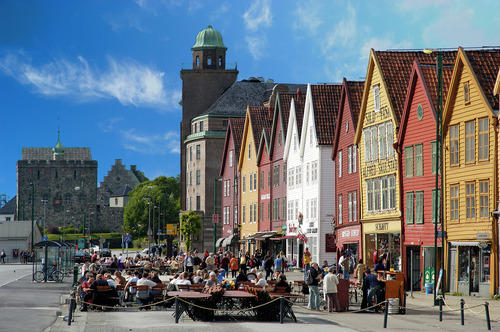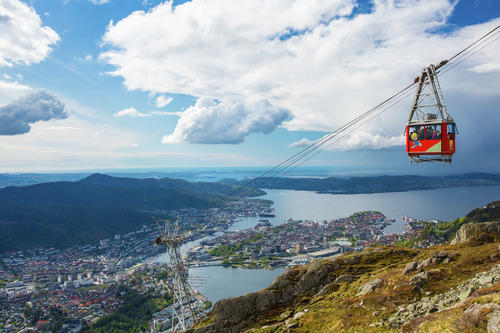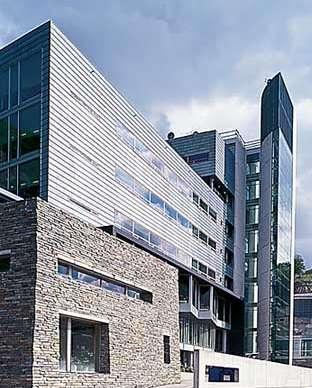3rd International p53 Isoforms Conference
You are invited to participate to the 3rd international p53 isoforms workshop in Bergen, Norway from the 18th -21st June 2017.

Main content
Dear Colleagues,
You are cordially invited to participate to the 3rd International p53 isoforms workshop in Bergen (Norway) from the 18th -21rd June 2017.
Over the last decade, new findings including the TP53 splice variants (p53 isoforms) have dynamically reformed the p53 field and have broadened the roles of p53 beyond cancer.
During the workshop, world leading scientists among which Mina Bissell, Judith Campisi, Simone di Giovanni, Curtis Harris, David Kaplan, Sir David Lane, David Malkin, Gerry Melino, Thomas Meyer, Moshe Oren, Varda Rotter,... will present their latest findings on the role of p53 and its isoforms in cancer, ageing, cell reprogramming, EMT, neurodegeneration, brain regeneration and infectious diseases. (Please find the latest program below.)
It will be discussed how mis-regulation of p53 isoforms activity due to pathogens infection or cellular damage leads to defect in tissue maintenance and regeneration. It will also be presented how activities of the different p53 protein isoforms (whether produced by WT or mutant TP53 gene) can be pharmacologically controlled to regenerate damaged tissue. Therefore, understanding the p53 isoforms’ mechanism offers exciting perspectives in the treatment of degenerative diseases such as cancer, neurodegeneration and other age-associated pathologies.
We believe that the organisation of the 3rd international p53 isoform workshop is timely to discuss the rapidly growing new developments and to generate fruitful collaborations between scientists, clinicians and pharmaceutical companies.
You can still submit abstract for poster presentation (deadline 7th June 2017). Poster size A0, portrait format.
Please register through this link.
Welcome!
Sincerely,
On behalf of the organising committee
Jean-Christophe Bourdon
Organising committee:
- JC Bourdon, Dundee, UK
- Bjorn Tore Gjertsen, Norway
- Antony Braithwaite, Dunedin, NZ
- Bertrand Mollereau, ENS, Lyon, France
- Varda Rotter, Weizmann Institute, Israel
- Pierre Roux, CRBM, Montpellier, France
- Olivier Terrier, Lyon, France
Scientific program
You can find the complete scientific program on this link (printable version).
Sessions and speakers
Introduction
- Prof Lars A. Akslen, Director of the Centre for Cancer Biomarkers CCBIO, University of Bergen – Norway
Session 1 – p53 isoforms as biomarkers
- Prof Bjørn Tore Gjertsen, University of Bergen - Norway
- Dr Stian Knappskog, University of Bergen - Norway
- Prof Kanaga Sabapathy, National Cancer Center - Singapore
- Dr Kelly Avery-Kiejda, University of Newcastle - Australia
- Keynote: Prof Anthony Braithwaite, University of Otago - New Zealand
Session 2 – TP53 mutation and p53 isoforms as biomarkers
- Prof Moshe Oren, Weizmann Institute of Science - Israel
- Dr Elisabeth Maritschnegg, Medical University of Vienna – Austria
- Dr Oleg Laptenko, Columbia University - USA
- Dr Sunali Mehta, University of Otago - New Zealand
- Dr Brianna Morten, University of Newcastle – Australia
- Prof Michal Sharon, Weizmann Institute of Science - Israel
- Keynote: Prof Judith Campisi, Buck Institute - USA
- Prof David Malkin, The Hospital for Sick Children - Canada
- Dr Hind Hafsi, IAB, Grenoble - France
- Stephanie Schubert, LUMC - The Netherlands
- Dr Pan Pantziarka, The Anticancer Fund - Belgium and The George Pantziarka TP53 Trust - UK
Session 3 – p53-based therapy
- Prof Klas Wiman, Karolinska Institute - Sweden
- Dr Naoise Synnott, St Vincent’s University Hospital - Dublin
- Prof Chandra Verma, National University of Singapore - Singapore
- Dr Joanna Zawacka-Pankau, Karolinska Institutet - Sweden
- Prof Varda Rotter, Weizmann Institute of Science - Israel
Session 4: How to control cell reprogramming and tissue regeneration? Lessons from the interaction infectious pathogens/p53 isoforms
- Keynote:Prof Thomas Meyer, Max Planck Institute for Infection Biology - Germany
- Dr Roy Chowdhury, University of Würzburg – Germany
- Dr Olivier Terrier, International Center for Infectiology Research- France
- Dr Julia Dubois, International Center for Infectiology Research- France
- Sebastien Joruiz, University of Dundee, Dundee Cancer Center - UK
Session 5 – p53 isoform in cancer, ageing, reprogramming
- Keynote: Prof Curtis Harris, NCI NIH - USA
- Prof Pierre Roux, CRBM CNRS – France
- Dr Marina Kazantseva, University of Otago - New Zealand
- Keynote: Prof Mina Bissell, Lawrence Berkeley National Laboratory - USA
Session 6 – effects of extra cellular matrix on p53
- Dr Sun-Young Lee, Lawrence Berkeley National Laboratory - USA
- Prof Giannino Del Sal, University of Trieste - Italy
- Dr Angelo Peschiaroli, Institute of Cell Biology and Neurobiology, CNR – Italy
- Dr Patricia Muller, CRUK Manchester Institute – UK
Session 7 – Degeneration and regeneration
- Keynote: Prof David Kaplan, Department of Neurosciences & Mental Health, Hospital for Sick Children – Canada
- Dr Izumi Horikawa, NCI NIH - USA
- Dr Tania Slatter, University of Otago - New-Zealand
- Prof Simone Di Giovanni, Centre for Neurotechnology, Imperial College of London - UK
- Dr Martin Fischer, University of Leipzig - Germany
- Prof Joaquin Maximilano Espinosa, University of Colorado - USA
- Dr Simon McDade, Queen’s University, Belfast - UK
- Prof David Meek, Dundee University, Dundee Cancer Centre - UK
- Keynote: Dr Jean-Christophe Bourdon, Dundee Cancer Center - UK
Session 8 – p53 family isoform in cancer and evolution
- Keynote: Prof Sir David Lane, A*STAR institute - Singapore
- Prof Gerry Melino, MRC Toxicology Unit, University of Leicester - UK
- Dr Yari Ciribilli, Laboratory of Molecular Cancer Genetics, CIBIO-Centre for Integrative Biology, University of Trento - Italy
- Dr Neda Slade, Ruđer Bošković Institute - Croatia
- Dr Yann Audic, Genetic and Development Institute of Rennes - France
- Prof Bertrand Mollereau, ENS Lyon - France


